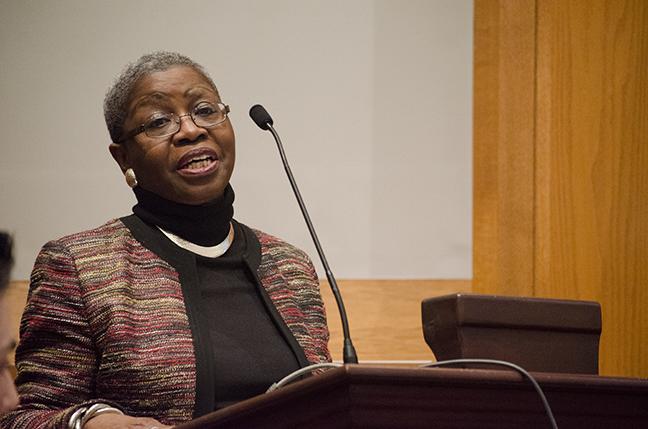USG reviews interim sexual misconduct policy
Student feedback to be collected through this weekend
February 7, 2014
Vice president of student affairs Louis Stark and vice president for inclusion, diversity and equal opportunity Marilyn Mobley presented the interim sexual conduct policy to the Undergraduate Student Government at Tuesday night’s general assembly meeting.
One of the most controversial topics of the presentation was the responsibility to report sexual misconduct. According to the policy, any member of the Case Western Reserve University community—students, faculty or staff—has a responsibility to report any sexual misconduct they witness or hear about, either directly from the victim or secondhand from a friend. Several USG members expressed concern that this requirement, which was already in the university’s previous sexual assault policy, would create a “chilling effect” preventing students from telling close friends if they are assaulted. Mobley, however, pointed out that both the victims and their friends fulfill their duty to report by going to a confidential source such as University Counseling Services, which does not investigate reports of sexual assault.
“We would want it to go the next step so that the person would be protected,” Mobley added. “I understand the desire of a friend to protect a friend… The challenge with that silence is that the person doing the misconduct is then free to continue doing it.”
Another question raised by multiple USG representatives was the scope of the policy in regard to off-campus activity. Stark clarified that the policy does not affect situations off-campus in which one of the people involved is not a CWRU student, but does extend to CWRU students off-campus at university-sponsored events such as study abroad programs and student-organized events such as parties.
The policy was updated due to a “Dear Colleague” letter sent by the U.S. Department of Education to all schools receiving federal funding in 2011 as a result of new statistics concerning sexual violence—one in five college women and 6.1 percent of college men experience it, according to the Department of Education. “There is a belief that this is almost an epidemic of sexual violence on [college] campuses,” Mobley noted.
The changes include a merger of what were previously the sexual assault and sexual harassment policies; clearer definitions of what constitutes consent, incapacitation and assault; and a designation of deputy Title IX coordinators who also serve as sexual assault investigators. Sexual assault, violence and harassment are covered under Title IX—a set of laws preventing sexual discrimination in education—since the “Dear Colleague” letter classifies sexual assault as a form of discrimination.
The university has been collecting feedback on the policy since the beginning of the year; however, Stark noted that the feedback form would only be online through this weekend. After this time, a committee of four people will review all the feedback and discuss making changes to the policy within the constraints of the “Dear Colleague” letter.
Although Stark said that official feedback collection ends this weekend, Mobley added that her office would continue to be open to input. “My office has oversight over the policy… You can always send information to our office and let us know if you have a concern.”
Mobley added that the offices of student affairs and diversity “are going to be pretty vigorous” in promoting knowledge of the new policy. Later this year, official training in the new policy will begin, and the committee in charge of the policy will hold an educational forum, bringing in outside speakers, to educate the CWRU community about the policy.


